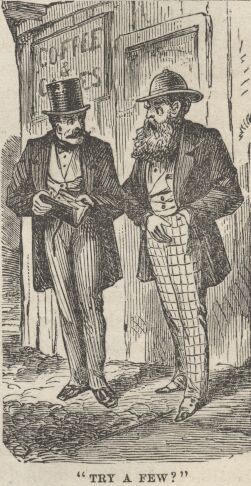 "Six months after my entry into journalism the grand “flush times” of Silverland began, and they continued with unabated splendor for three years. All difficulty about filling up the “local department” ceased, and the only trouble now was how to make the lengthened columns hold the world of incidents and happenings that came to our literary net every day. Virginia had grown to be the “livest” town, for its age and population, that America had ever produced. The sidewalks swarmed with people—to such an extent, indeed, that it was generally no easy matter to stem the human tide. The streets themselves were just as crowded with quartz wagons, freight teams and other vehicles. The procession was endless. So great was the pack, that buggies frequently had to wait half an hour for an opportunity to cross the principal street. Joy sat on every countenance, and there was a glad, almost fierce, intensity in every eye, that told of the money-getting schemes that were seething in every brain and the high hope that held sway in every heart. Money was as plenty as dust; every individual considered himself wealthy, and a melancholy countenance was nowhere to be seen. There were military companies, fire companies, brass bands, banks, hotels, theatres, “hurdy- gurdy houses,” wide-open gambling palaces, political pow-wows, civic processions, street fights, murders, inquests, riots, a whiskey mill every fifteen steps, a Board of Aldermen, a Mayor, a City Surveyor, a City Engineer, a Chief of the Fire Department, with First, Second and Third Assistants, a Chief of Police, City Marshal and a large police force, two Boards of Mining Brokers, a dozen breweries and half a dozen jails and station-houses in full operation, and some talk of building a church. The “flush times” were in magnificent flower! Large fire-proof brick buildings were going up in the principal streets, and the wooden suburbs were spreading out in all directions. Town lots soared up to prices that were amazing.
"Six months after my entry into journalism the grand “flush times” of Silverland began, and they continued with unabated splendor for three years. All difficulty about filling up the “local department” ceased, and the only trouble now was how to make the lengthened columns hold the world of incidents and happenings that came to our literary net every day. Virginia had grown to be the “livest” town, for its age and population, that America had ever produced. The sidewalks swarmed with people—to such an extent, indeed, that it was generally no easy matter to stem the human tide. The streets themselves were just as crowded with quartz wagons, freight teams and other vehicles. The procession was endless. So great was the pack, that buggies frequently had to wait half an hour for an opportunity to cross the principal street. Joy sat on every countenance, and there was a glad, almost fierce, intensity in every eye, that told of the money-getting schemes that were seething in every brain and the high hope that held sway in every heart. Money was as plenty as dust; every individual considered himself wealthy, and a melancholy countenance was nowhere to be seen. There were military companies, fire companies, brass bands, banks, hotels, theatres, “hurdy- gurdy houses,” wide-open gambling palaces, political pow-wows, civic processions, street fights, murders, inquests, riots, a whiskey mill every fifteen steps, a Board of Aldermen, a Mayor, a City Surveyor, a City Engineer, a Chief of the Fire Department, with First, Second and Third Assistants, a Chief of Police, City Marshal and a large police force, two Boards of Mining Brokers, a dozen breweries and half a dozen jails and station-houses in full operation, and some talk of building a church. The “flush times” were in magnificent flower! Large fire-proof brick buildings were going up in the principal streets, and the wooden suburbs were spreading out in all directions. Town lots soared up to prices that were amazing.
The great “Comstock lode” stretched its opulent length straight through the town from north to south, and every mine on it was in diligent process of development. One of these mines alone employed six hundred and seventy-five men, and in the matter of elections the adage was, “as the ‘Gould and Curry’ goes, so goes the city.” Laboring men’s wages were four and six dollars a day, and they worked in three “shifts” or gangs, and the blasting and picking and shoveling went on without ceasing, night and day." (Roughing It)
Linda Morris, in Mark Twain in Context writes:
Virginia City, where he lived as a writer for the Territorial Enterprise after his time in Carson City, was a rough-and-tumble town, with a population of about 10,000 in the early 1860s. .... The Territorial Enterprise office was on the town’s main street, “C” street, and only one block below it on “D” street are lines of small cabins where the prostitutes lived. While there is no evidence that Twain ever frequented these cabins ... he would have invariably been in their company in the many bars where Twain and his friends hung out.
Julia Bulette is of special interest not only because of her status in the town at the time Twain lived there, but because she was ultimately murdered in her bed and widely mourned in the town. Mark Twain, returning to visit Virginia City in 1868, was present at the hanging of the accused murderer, John Melanie, a Frenchman. Twain famously described the hanging in great detail in a letter to the Chicago Republican, marveling at the coolness with which Melanie (who maintained his innocence until the end) approached his own death (“Novel Entertainment”). It is estimated that 3,000 people were present to witness the execution. Twain downplayed the fact that the woman he murdered was a well-known prostitute, but every one of those 3,000 witnesses would surely have known that fact.